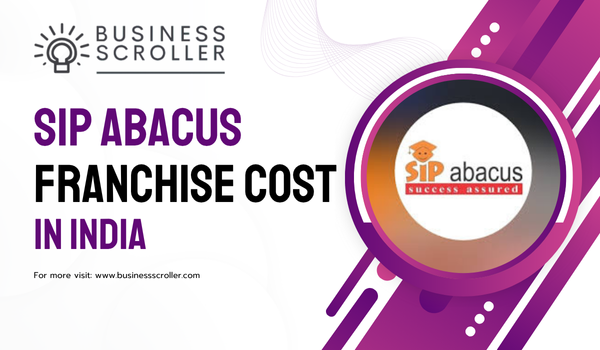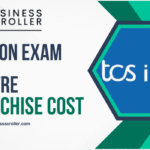SIP Abacus (part of SIP Academy India Pvt. Ltd.) is one of the well-known abacus education / skill development brands in India, offering programs to improve children’s numerical skills, concentration, visualization, etc. It has been operating since 2003 in India (originating from Malaysia) and has built a network of centres across many states.
If you are considering becoming a franchisee of SIP Abacus, here is everything you need to know.
What is the Franchise Model of SIP Abacus

- Brand & Curriculum Support: Franchisees receive access to the SIP Abacus curriculum, teaching materials, training programs (abacus methodology, pedagogy, classroom management), branding / signage and marketing support.
- Centre / Offline Model: Most centres are offline — with classroom(s), furniture, signage etc. The model often assumes the franchisee will run the centre (or manage staff) rather than purely online.
- Territory / Local Presence: Each franchisee typically has a local area, possibly some exclusivity / support from local “State Head” offices or area offices. State / area management exists.
- Revenue Share: Revenue from student enrolments is shared — the model shows a per-student fee, with splits for franchise (centre), teacher (instructor) and company (SIP).
Estimated Investment & Franchise Cost
Here are current publicly known / published estimates for what it costs to start an SIP Abacus centre. These are approximate and vary depending on city/metro vs non-metro, rent, size, local costs, etc.
| Cost Component | Approximate Amount | Notes / Conditions |
| Franchise Fee (one-time) | Metro cities: ~ ₹2,00,000 Non-metro towns: ~ ₹1,80,000 | This fee secures your place in SIP’s network and includes branding materials. |
| Total Initial Investment | ~ ₹7,35,000 | Includes all costs like furniture, branding, classroom setup, signage, marketing launch, rental advance, operational expenses for first 1-2 months. |
| Area / Centre Size Required | Around 600-800 sq ft | Usually two classrooms, reception, basic facilities. Location in commercial / semi-commercial area preferred. |
| Rent / Advance | Included as part of the ₹7.35 lakh (rental advance component ~ ₹2,00,000 in many cases in metros) | Depending on property rates in your city, this could vary a lot. |
Expected Revenue, ROI & Payback Period
Based on shared figures and case-studies / sample projections, here’s what you can reasonably expect:
- Monthly Revenue (with ~100 students) in a metro centre: ~ ₹1,30,900
- Monthly Expenses (rent, staff, utilities, marketing etc.): ~ ₹50,000 (this is an estimate for a well-managed centre)
- Net Profit per Month in early year (once enrolments reach 100): ~ ₹80,900 in metro; lower in non-metros.
- Pay-back / Break-even Timeline: Many SIP Abacus franchisees reach break-even in 4-6 months, assuming good student enrolment, efficient operations.
- Growth over time: Once the centre stabilizes, adding more classes, increasing student numbers, possible extended hours / batches, local reputation helps growth.
Thus, the Return on Investment (ROI) is relatively strong if you manage well, pick a good location, and get initial enrolments quickly.
Eligibility Criteria for SIP Abacus Franchisees
While SIP Abacus doesn’t publicly publish a super-rigid list, based on their website and franchisee stories, here are the common eligibility / desirable profiles:
- Financial Capacity
- Ability to invest the initial amount (~₹7-8 lakh or as per metro/non-metro estimate).
- Enough working capital for first few months until student enrolments stabilize.
- Suitable Real Estate / Location
- Access to ~600-800 sq.ft in a commercial or semi-commercial locality. Good visibility, near schools/residential clusters helps.
- Lease / rental agreement that allows you to set up branding, signage etc.
- Passion for Education / Skill Development
- While prior experience in education is helpful, it’s not strictly mandatory. SIP Abacus provides training.
- Good communication skills, ability to manage students & teachers, maintain discipline, ensure quality of instruction.
- Operational Commitment
- Being hands-on in operations, especially early on. Even if you hire staff, you will need to monitor arrivals/enrolments, quality, cleanliness, customer service.
- Marketing effort locally — conducting demo classes, tie-ups with schools, parent engagement etc.
- Legal & Regulatory Compliance
- Proper registration of business (company / LLP / proprietorship as applicable).
- Permits / licenses depending on local municipal / regulatory requirements.
- Adherence to safety, hygiene, child safety etc.
- Good Reputation & Local Network
- Having good standing in local community helps. Parent trust is key in education services.
- If you have a network in schools, or with parents, you may accelerate student intake.
Steps to Apply – Process Overview
Here is the step-by-step process to become an SIP Abacus franchisee, with tips to ensure smoother execution:
- Initial Inquiry & Information Gathering
- Visit the SIP Abacus / SIP Academy website and fill their ‘become a franchisee’ or ‘own franchise’ inquiry form.
- Alternatively contact their corporate office via email/phone (see contact section below).
- Meeting & Evaluation
- SIP will usually arrange a meeting (or virtual) with you to understand your interest, financial capacity, proposed location. State Head / Area Manager may inspect or evaluate your proposed site.
- Franchise Agreement & Fee Payment
- Once both sides agree, you’ll sign the franchise agreement. It will include terms & conditions, territory rights, duration, renewal, revenue share, roles & responsibilities.
- You’ll pay the franchise fee (₹2,00,000 in metros or ₹1,80,000 in non-metros as per current published rates).
- Centre Setup & Infrastructure
- Secure your premises, carry out required fit-out (classrooms, furniture, signage). Pay rental advance, paint classrooms, get branding materials installed.
- Get necessary basic infrastructure: blackboard/whiteboard, learning aids, abacus kits, teaching materials etc.
- Training & Support
- Attend SIP Abacus’s Entrepreneur Orientation Programme (EOP) and other training on teaching methodology, operations, student enrollment, marketing.
- Get marketing kit / welcome kit: course books, promotional material, certificates, etc.
- Launch & Marketing
- Do a soft launch perhaps with demo classes to attract parents & students.
- Use branding / signage / local advertisements, online / offline promotions. SIP also helps with marketing support.
- Operations & Scaling
- Manage day-to-day operations carefully — class scheduling, teacher hiring, student progress, customer satisfaction.
- Monitor enrollment numbers, feedback. Work towards reaching threshold student numbers (say 80-120) to make revenue targets.
- Possibly expand to more batches / additional classes as demand grows.
Key Figures & What to Expect — Metro vs Non-Metro
- Initial Investment: Metro ~ ₹7,35,000; Non-metro a bit lower (most costs similar except rent, maybe branding costs somewhat less)
- Franchise Fee: Metro ~ ₹2,00,000; Non-metro ~ ₹1,80,000
- Break-even: Usually 4-6 months if things go well (i.e. good enrollment and location).
- Monthly Revenue & Profits: With ~100 students, revenue ~ ₹1,30,900; expenses ~ ₹50,000; net profit ~ ₹80,900 in metro centres. Non-metro will have lower top-line and possibly lower expenses but also lower revenue.
Advantages & Risks
Advantages
- Lower investment compared to many retail / food franchises.
- Demand is steady: parents often pay for supplementary education / skill development for their children.
- Strong brand recognition and support from SIP Abacus (curriculum, training, marketing).
- Flexibility: you may start small, scale as enrolments grow.
Risks / Challenges
- Finding good location with enough student base; in non-prime areas, enrolment may be slower.
- Rent / property costs: even though centre size is moderate (600-800 sq ft), in metros real estate is expensive.
- Operational discipline: quality of teaching, teacher retention, customer satisfaction matter a lot. Poor quality leads to dropout and reputation loss.
- Marketing efforts required early: need to give demo classes, build parent trust. Marketing cost may be higher than anticipated.
- Competition: Many abacus / Vedic math / skill-development centres, local tutors etc.
Official Contact Information
For authentic, up-to-date information, get in touch with SIP Abacus / SIP Academy India via their official contact points:
- Corporate / Franchisor Email: sipinfo@sipacademyindia.com
- Corporate Office Address:
SIP Academy India Pvt. Ltd.
Kences Towers, 7th Floor, 1, Ramakrishna Street, Off. North Usman Road, T. Nagar, Chennai – 600017.
- Phone: 044-42023331 / 044-42605609
When you send a franchise enquiry, subject line could be: “SIP Abacus Franchise Enquiry – [Your City]”. Include in your email: your financial capacity, proposed location / premises details (size, lease status), experience (if any), timeline for investment, and any questions you have (royalty, support, exclusivity etc.).
Final Word & Practical Suggestions
If you are seriously considering SIP Abacus franchise, here are some extra tips to increase your chances of success:
- Scout locations carefully: the student base (schools nearby, residential density, parents’ willingness to pay) matters more than just rent. Sometimes paying a bit more for a good location is better than cutting costs but having low enrolments.
- Start lean but with quality: invest in good teaching staff, good teaching aids, cleanliness, safety. Word-of-mouth matters hugely in education.
- Local marketing & demo classes: especially at the start, give free demo classes in nearby schools, put up local advertisements, use social media, parent referrals.
- Regular reviews & monitoring: track student progress, feedback, teacher quality. SIP has mechanisms; use them.
- Plan for scaling: once one centre stabilizes, consider adding more batches, possibly more centres, or converting certain classrooms into additional grades or levels.

Shashi Kant is the Founder and Editor of BusinessScroller.com, a leading platform for business insights, finance trends, and industry analysis. With a passion for journalism and expertise in business reporting, he curates well-researched content on market strategies, startups, and corporate success stories. His vision is to provide valuable information that empowers entrepreneurs and professionals. Under his leadership, BusinessScroller.com has grown into a trusted source for in-depth articles, customer care guides, and financial expertise.


